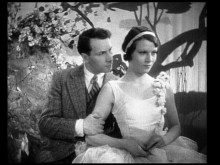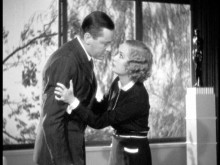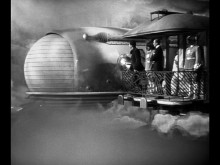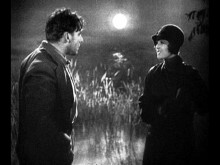I realize the title of this sounds like it’s connected in some way with Miss Goldilocks and her adventures with that bear family, but it grows out of a question that arose the other day concerning how much a person should know about a movie before seeing it. Of course, this is not a one-size-fits all proposition. Some movies rise or fall on surprising the viewer, but those are specialized cases. But how much is enough for most movies?
This is a tricky proposition, especially in our information-saturated age with its endless blogs and blurbs, its specialized message boards, and its often perplexing array of communication alternatives. I can’t complain about this, since I do two columns—this and the “Weekly Reeler”—that never see ink of print, only light of monitor, and I’ve moderated a message board since January of 2000. I avail myself of some—but by no means all—of the tools of the age. To some degree this is inescapable. I cannot do the “upcomers” for the paper without knowing something about what’s opening on a given week. (And, yes, though we retain—I’m not sure why—the notion that the “upcomers” just appear by magic—hence, the word “I” never surfacing in them—I do write them.) That’s even more true of the “Weekly Reeler” (where the fiction of no human agency being involved applied to the “upcomers” is dropped).
There are, however, some things I don’t do in any tenacious manner. I don’t closely follow any of the sites that purport to keep one completely abreast of what’s coming and what the “next big thing” is. As I said when asked about this by a reader not long ago, this is partly a time constraint. I simply haven’t the time to do this, but I’m not sure I would anyway. It strikes me as information overload a good deal of the time, and it’s often fraught with errors—both of fact and judgment. I grant you that the latter is somewhat subjective, but early hype has been known to result in nothing once a film curls up and dies in New York and Los Angeles. But there’s more than that—I simply like to be surprised on occasion.

Some of my most pleasurable moviegoing experiences have been with movies about which I knew absolutely nothing when I encountered them. One that always comes to mind is Neil Jordan’s Breakfast on Pluto (2005). I suppose I ought to have known about it, but when Sony Pictures Classics arranged a special press screening in the annual push for a critics’ association vote and a shot at Ten Best lists, I’d never heard of it. And I went to it pretty much cold. It ended up being my number one film of 2005. I don’t think surprise entered into that, and in fact I took advantage of the print being there and had it run again later that evening, so it wasn’t a first flash affair. Nonetheless, coming upon it unaware was a plus from a personal standpoint.
All of this, however, is somewhat specialized and beside the overall point. I’m more curious about how much people generally like to know about a movie before they see it. This, I suspect, will vary a great deal from person to person based on temperament. I know some folks want start discussing a movie before they even get out of the theater and that’s fine, though I don’t care for it myself as a rule—beyond a simple initial response (“Well, that blew goats” is enough in some cases). It’s different after a screening where I’m not seeing the film for the first time. I’m good with that. In the same way, I imagine some people want to enter a film fully-prepared, while others might like to know nothing more than the inescapable.

I prefer to strike a happy medium myself. (I hate it when spiritualists smile too much.) I know firsthand how it’s possible to get expectations too high. This is especially true in terms of classic movies—and even more true back in the old days when it was far easier to read about a movie than to see it. I cannot tell you how jazzed I was by what I’d read about Rene Clair’s Le Million (1930) over the years. This, I thought, must be one of the most remarkable of all early talkies, based on what had been written. When I caught up with it in the early 1990s, I was gravely disappointed. It took about 15 years—and a sale on Criterion DVDs—to get me to try it again, at which time I found it utterly delightful.

Contrariwise, the fact that two friends of mine who saw it first had been disappointed by Ernst Lubitsch’s highly-regarded Trouble in Paradise (1932) made me approach it cautiously and it was love at first sight. And I wondered what the hell was wrong with my friends. (In the case of the Occasonal Commenter Known as Rufus, I more understood it since he’d seen it just after seeing the 1932 Rouben Mamoulian film Love Me Tonight, which is a lot flashier.) For me, it was—and is—the best thing Lubitsch ever made. Indeed, I saw it first on a high-quality bootleg tape and was so taken with it that I rewound it and watched it again immediately. Would I have been so impressed if I’d been expecting “too much?” I can’t say, but I admit the possibility.

It’s, of course, equally possible to build a thing up in your mind based on very little. When I was 16 or 17 I saw a photo in a book in the school library from Frank Borzage’s Liliom (1930). And I was so fascinated by that image that I tracked down the Ferenc Molnar play on which it was based and read it. That only served to interest me more. I finally saw the movie itself about 39 years later when it was handed to me as preparation for appearing in a documentary on Borzage and F.W. Murnau. The producer of the documentary asked me if it had been worth the wait and I told him something like, “It was probably worth waiting 38 years.” That didn’t make it into the documentary. Pity really, because the film both did and didn’t live up to my image of it.

It’s very easy to oversell a movie by enthusiasm. I’ve actually had people tell me they liked me telling them about a film far better than the film itself. That’s flattering in some way, but it wasn’t the result I hoped for. As a result, I try to be rather cautious about talking too much about a classic movie I think someone should see. If I know them very well, I might say more—or note that I think it’s something they’ll like. Justin Souther could better address how well I do on that score than I can. I am of the opinion that I told him very little about F.W. Murnau’s Sunrise (1927) . I do know that afterwards, he told me that it made him better understand me and my taste. I’m still puzzling that one out.
I’m certainly not arguing for an ill-informed viewership. That I find absurd in the extreme and virtually impossible unless you live in a cave or are just completely oblivious. (Roger Ebert at least used to refuse to watch trailers.) I think you should know something about a movie simply so you have a clue about whether or not you even want to watch the damned thing—certainly, you should know beforehand if it’s likely to offend you, assuming you’re the type who gets offended.
All of this makes me wonder if I’d have liked Gone with the Wind (1939) better if I hadn’t known I was going to see “the greatest movie ever made” (according to my mother). I kind of doubt it, but I did like it better years later than on that original exposure. How many film students would really love Citizen Kane (1941) if it wasn’t forced on them as the bee’s knees of cinema? A great many more than actually do now, I suspect.
I turn the floor over to readers.




I prefer to know as little as possible about a film before going in. If I know enough to make my decision to see the film, that’s enough.
I will see any film put out by the Coen Brothers, so I avoid watching the trailers, reading any reviews or even plot synopses before going in. This always results in a more enjoyable experience. I’m never waiting for the plot to catch up to what I know from the trailer, I have only the vaguest expectations – I went into A SERIOUS MAN not knowing if it was a drama or a comedy – and typically see this kind of film early enough in the run that I’ve avoided most of any hype there may be. Afterwards, I’ll usually read anything I can find about the film – reviews, interviews, dissections of the plot, trailers, featurettes, etc. – if I enjoyed it, and occasionally go back a second time and have a great second-run experience.
On the other hand, if the only known quantity involved is an actor or a producer, I’ll usually watch the trailer and read Ken’s review before making up my mind.
I like Trouble in Paradise quite a bit, but for some reason there’s just something….lacking in that film. Maybe it’s that Herbert Marshall just feels like a B list star to me in a role that demanded William Powell (or Cary Grant about a decade later).
Sometimes reviews can be misleading. For years I always dreaded the Lugosi movie Night of Terror due to Maltin’s BOMB rating, theoretically making it worse than anything Bela did at Monogram. Yet when I saw the film I absolutely loved it and have shown it to others and everyone else I’ve shown it to has had a blast watching it.
I prefer to know as little as possible about a film before going in. If I know enough to make my decision to see the film, that’s enough.
I will see any film put out by the Coen Brothers, so I avoid watching the trailers, reading any reviews or even plot synopses before going in.
This, of course, is not an option that is open to me, but I do have a question about how you quite manage this — and, more to the point, how do you even find out that the film in question exists or is playing? How do you avoid trailers? I understand that it’s possible not to watch them online (which is scarcely watching them in my book), but how do you avoid them in the cinema? Do you time your entrance? It simply seems impractical to me on a day-to-day basis — and a good deal of effort.
And you’re only dealing with new releases. How do you apply this to older movies? Oh, it’s pretty easy to avoid the trailers there (a lot of them don’t even seem to exist), but with a bewildering array of titles going back 90 years it seems some kind of roadmap is essential. The real question, I think, is whether you want more than the simple recommendation that you should see a given title? If I tell you, you really need to see Lubitsch’s One Hour with You is that all you want, or do you want to know why?
I like Trouble in Paradise quite a bit, but for some reason there’s just something….lacking in that film.
Unsurprisingly, I am in 100 percent disagreement with your assessment.
Maybe it’s that Herbert Marshall just feels like a B list star to me in a role that demanded William Powell (or Cary Grant about a decade later).
Again, I disagree — though if he feels B list to you, there’s nothing to be done about that part of it. But I absolutely think either of your choices would seriously damage the tone of the film and turn it into a personality vehicle for them. For me, Marshall is a perfect fit.
Sometimes reviews can be misleading.
Because a review doesn’t reflect your taste does not make it misleading. It merely means that it expresses an opinion contrary to your own. While I disagree with Maltin — or more likely one of his body of reviewers (and I could probably put a name to him) — I don’t think it’s exactly misleading. It clearly does not express my take on Night of Terror. It does, however, reflect the view of a lot of Lugosiphiles (a strange lot, even if I am one of them) who dismiss the film as one of the star’s “butler” roles.
Of course, I had seen Night of Terror several times before Maltin’s original TV Movies came out in 1969, so I wasn’t swayed by it — and was immediately skeptical of taking him at face value (not just for that review). There is something to be said for the ignorance of the era when horror pictures were shown on the late show every Friday note and you just watched whatever they played. In a sense, that’s what we’re trying to do with the Thursday Horror Pictue Show screenings.
But the point you raise is a good one, because you offer a perfect example of how it’s possible to miss out on something you might really like by putting too much faith in single source reviews unless the reviewer has a proven track record of reflecting your taste. Even that’s not infallible, but it helps.
This, of course, is not an option that is open to me, but I do have a question about how you quite manage this—and, more to the point, how do you even find out that the film in question exists or is playing? How do you avoid trailers? I understand that it’s possible not to watch them online (which is scarcely watching them in my book), but how do you avoid them in the cinema? Do you time your entrance? It simply seems impractical to me on a day-to-day basis—and a good deal of effort.
They only screen one or two trailers before the films here – it’s mostly ads. I usually arrive about five minutes before the movie’s due to start, so I miss all but one trailer. If that one happens to be one I’m avoiding, I shut my eyes and put my hands over my ears. I don’t watch commercial television, so I don’t see TV spots and as you said, it’s easy to choose not to watch them online.
And you’re only dealing with new releases. How do you apply this to older movies? Oh, it’s pretty easy to avoid the trailers there (a lot of them don’t even seem to exist), but with a bewildering array of titles going back 90 years it seems some kind of roadmap is essential. The real question, I think, is whether you want more than the simple recommendation that you should see a given title? If I tell you, you really need to see Lubitsch’s One Hour with You is that all you want, or do you want to know why?
Well, it would be in that case, because Lubitsch is a known quantity for me and I know enough about your taste to assume that a Lubitsch film you recommend would be worth my time watching. In other cases, I’d probably need a little more. All I knew about THE PHILIDELPHIA STORY going in was that it was a romantic comedy staring Grant, Hepburn and Stewart and it was the basis for HIGH SOCIETY (which I hadn’t seen at that point). I knew it was generally well-regarded. That was enough.
The amount of information I need is inversely proportionate to the amount of known quantities involved. Usually all I need is director and/or star, genre and a recommendation from someone I trust.
Jeremy since seeing A Serious Man have you seen the trailer its pretty great. One of the best trailer to come along in a while.
They only screen one or two trailers before the films here – it’s mostly ads.
Wow. I mean really — wow. Even I try to program three trailers (assuming I can find them, which isn’t always so easy) for the AFS and THPS screenings. (I don’t share your aversion to trailers.) They are really behind the times in Australia when it comes to the pitch. Let me describe it for you —
We have one theater that has two or three trailers and no ads — that ‘s the Fine Arts. (We’re talking first-run houses.) The others all have a block of ads that run about 20 minutes followed by four to seven trailers. Now, the ads are called “pre-show entertainment” and are diguised to look like entertainment news. These are, in all fairness, run 20 minutes before the start of the trailers, which begin at the advertised showtime. At least that’s the theory. Last I knew — and I haven’t set foot in a Carmike Cinema for months — Carmike was more insidious about it. Their “pre-show entertainment” ends about five minutes after the advertised showtime — with the “important” ads located in those five minutes. This is then followed by the altogether separate Coca Cola ads, their own special(s) and the PSA for whatever charity they’re involved in at the moment. Then you get the trailers (they’re the only place I’ve ever seen go to seven trailers) and then you get a thing extolling the greatness of the cinema chain. Finally — 20 to 30 minutes after the advertised showtime — you get the movie. I have, on occasion, actually forgotten what the feature is going to be by the time it starts.
You can see why “one or two trailers” amazes me.
All I knew about THE PHILIDELPHIA STORY going in was that it was a romantic comedy staring Grant, Hepburn and Stewart and it was the basis for HIGH SOCIETY (which I hadn’t seen at that point). I knew it was generally well-regarded. That was enough.
When I first saw The Philadelphia Story the fact that it was made in 1940 and starred Cary Grant was enough (actually at that age — I think I was 12 — either would have done it). I was stunned to realize — after a few minutes — that this was High Society with a better script and direction (a plus) and no songs (not a plus, but not a minus exactly).
The amount of information I need is inversely proportionate to the amount of known quantities involved. Usually all I need is director and/or star, genre and a recommendation from someone I trust
But is it all you want? Alternatively, do you object to more? If, for example, we were going to see something of this nature and I was familiar with it, would you prefer if I said nothing preparatory?
Jeremy since seeing A Serious Man have you seen the trailer its pretty great. One of the best trailer to come along in a while.
I have and I completely agree with you. An absolutely marvelous piece of work – it’s a great short film in and of itself!
If, for example, we were going to see something of this nature and I was familiar with it, would you prefer if I said nothing preparatory?
Yes.
If, for example, we were going to see something of this nature and I was familiar with it, would you prefer if I said nothing preparatory?
Yes.
If memory serves, you would also prefer to see a film with little or no audience in attendance other than yourself?
When I went to Flat Rock, they didn’t have any trailers.
If memory serves, you would also prefer to see a film with little or no audience in attendance other than yourself?
That’s more about getting a good seat and not being bothered by cell phones, chattering and the sound of loud candy wrappers. But I enjoy seeing films with specialist audiences, as they’re usually engrossed and appreciative and don’t spoil the film for others. It’s nice seeing REAR WINDOW and sensing the rest of the crowd inching forward on their seats at the same time you do.
When I went to Flat Rock, they didn’t have any trailers.
It’s easy for me to forget about them. I only go there if they have an exclusive that I haven’t otherwise seen. The last time that happened was the remake of Sleuth (back in Dec. 2007). Last I knew they ran a trailer or two. But since they were running Girl from DVD that would have been awkward.
That’s more about getting a good seat
Well, you kind of create that concern by arriving late to avoid trailers.
But I enjoy seeing films with specialist audiences, as they’re usually engrossed and appreciative and don’t spoil the film for others. It’s nice seeing REAR WINDOW and sensing the rest of the crowd inching forward on their seats at the same time you do.
There is no good film that isn’t made more enjoyable by a good audience — at least in my book. (Of course, being seeing something like R.V. with an audience laughing madly just makes the experience that much more perplexing.)
I like to know the basic storyline (or at minimum the genre), who the actors are and, sometimes, the director (I admit I cannot keep up with all of the directors beyond the ‘big names’, both past and present). I try not to read reviews, or at least very limited and selected reviews, particularly for new films (I really hate spoilers). For older titles, it doesn’t matter too much.
Some of my most memorable experiences (not necessarily always positive, but memorable) are spur-of-the-moment decisions to catch films I knew absolutely nothing about save what was on the marquis and posters. A couple that come to mind in that regard are Eraserhead and Liquid Sky (both were late-night showings at an art repertory theater).
I have been disappointed when I’ve read nearly universally glowing reviews beforehand, get all psyched, and walk out less than ovewhelmed. I prefer to not have myself all jacked up for a highly touted film only to be let down, so I minimize reading reviews (although I have never purposely avoided a review in this publication).
As for trailers, I also watch very little commercial television; trailers (not ads) before the main feature are, to me, an intrinsic part of the movie-going experience, so they don’t bother me at all.
Sometimes I go back and read Ken’s reviews of films from years past that I never saw, and as a result, will seek certain titles out. That is usually a positive experience.
I have been disappointed when I’ve read nearly universally glowing reviews beforehand, get all psyched, and walk out less than ovewhelmed.
To be honest, when I see something that’s almost universally praised, I tend to become very wary indeed.
As for trailers, I also watch very little commercial television; trailers (not ads) before the main feature are, to me, an intrinsic part of the movie-going experience, so they don’t bother me at all.
Me neither — and how else would I get to use that by now time-honored phrase, “That has Justin written all over it”? Then again, when you see as many movies as I do, it can become easy to burn out on a trailer that crops up too often.
Sometimes I go back and read Ken’s reviews of films from years past that I never saw, and as a result, will seek certain titles out. That is usually a positive experience.
There’ve been a few occasions when that’s more than I could say, but thank you.
Sometimes I go back and read Ken’s reviews of films from years past that I never saw, and as a result, will seek certain titles out. That is usually a positive experience.
I’ve done this many times also. I do it in reverse too, after watching a film on DVD, I’ll usually scan the MX archives to see if Ken or Justin have dealt with it in the past.
“I do it in reverse too, after watching a film on DVD, I’ll usually scan the MX archives to see if Ken or Justin have dealt with it in the past”
I do that sometimes as well. Usually, I find that Ken’s review (or Justin’s) was spot on (but once in a rare while I will just shake my head and go ‘huh’?)
I too prefer to know as little as possible about a movie before I see it. Trailers tend to show too much, but I take trailers with a grain of salt and consider them just propaganda. The main thing I take from a trailer is that if none of the scenes in a trailer of a comedy are funny then I won’t go see it. “Furry Vengeance” is a prime example.
So, how to decide? I use a handful of critics based on the experience that they tend to like the same movies I do. I also rely on word of mouth from a very few trusted friends. Sans any other reliable information the reviews on Netflix often seem to be fairly decent. I think this is because you can’t post free reviews like the 5 star review “horror shows” at Amazon and IMBD. Finally I just get a gut feeling that it might be interesting.
I never buy “great movie blah blah blah hype”. “Gone With The Wind” was entirely underwhelming and stupid to me. How that slow boring soap opera about self-absorbed losers can be considered the greatest movie ever I’ll never know. “Dr Strangelove” is a better candidate IMHO. Heck, even “Raising Arizona” is a better candidate. Other examples of movies that friends gushed about that I hated were “Top Gun” (incredibly stupid) and the original “The Last House On The Left” (cheap, vicious and an entirely unpleasant experience). On the other hand everyone told me that “Vanilla Sky” and “The Box” sucked but I kind of liked them. I guess my tastes are just too different from most people so I don’t take most recommendations seriously.
In the end a movie is only a few bucks and even if it is bad seldom is it so bad that I can’t wring some unintentional humor from it. Even ineptitude can act as a powerful message. “Who greenlighted that?!!???”
but once in a rare while I will just shake my head and go ‘huh’?
So do I.
I find I have a better time when I know almost nothing, but I have a tendency to work against myself by being overexcited to see something new and consuming trailers and reviews ahead of time. As a result, I especially appreciate when filmmakers keep things secret. Chris Nolan’s handling of INCEPTION is a good example of this.
On that note, I’m trying my best to restrain myself and allow BLACK SWAN to remain a mystery.
On that note, I’m trying my best to restrain myself and allow BLACK SWAN to remain a mystery.
Well, I watched the trailer last night — we put it on Tommy — and it’s still pretty much a mystery to me.
“Well, I watched the trailer last night—we put it on Tommy—and it’s still pretty much a mystery to me.”
I have seen the trailer, and it was certainly intriguing, but I have to make myself stop there, which means no reading a ton of articles about it before I see it, which I have a tendency to do with movies I’m excited about.
I have seen the trailer, and it was certainly intriguing, but I have to make myself stop there, which means no reading a ton of articles about it before I see it, which I have a tendency to do with movies I’m excited about.
It’s going to be tricky in my job not to find out more than I want to know about this one. The main thing I don’t want to know before I see it is whether or not what the trailer suggests near the end is going on really is going on.
I prefer to know as little as possible about a film before I see it, unless it is a film I wouldn’t see except that someone tells me a bit about it.
I am very happy I knew pretty much nothing about “Inception” when I went to see it and was happy to know nothing. But someone needed to tell me about “Brothers” for me to be willing to watch.
Having said that, when I read Ken’s articles, I am drawn to many films I didn’t know about and would not have thought to seek out except for reading about them here…..
Having said that, when I read Ken’s articles, I am drawn to many films I didn’t know about and would not have thought to seek out except for reading about them here…..
The only real difference between this and 40 years ago is that back then I made you watch them on TV or took you to them.